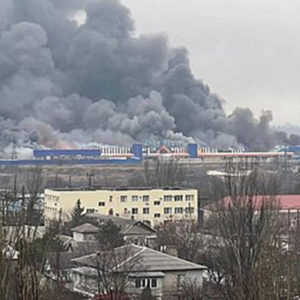Co-author: Anastassia Fedyk of UC Berkeley, Tania Babina of Columbia University, Tetyana Balyuk of Emory University and James Hodson of AI for Good Foundation
President Biden’s passionate words in Poland over the weekend encapsulate the growing shock and terror the world feels as we watch Russia destroy Ukraine. But while Biden has refused to apologize for expressing “moral outrage” over Putin’s brutality, fears of a third World War prevent US and Europe from taking direct military action. . Inside Ukraine, however, it seems that World War III has already begun.
Unable to take Kiev in a few days, the Russian army bombs civilians. Unable to take Mariupol, the Russian army launched a siege that is strangely reminiscent of what Nazi Germany once did to Putin’s hometown, Leningrad. Unable to force Ukrainians to surrender, Russian soldiers shoot protesters and evacuees and deport Ukrainian civilians to Russia.
Rockets landed 15 miles from Poland, a drone loaded with bombs crashed in Zagreb, and Russia engaged in nuclear rhetoric and threats against EU member states Finland and Sweden. Despite Putin’s claims that he will refocus on the eastern regions, Russia continues its assault on Kiev and is moving further and further west. President Biden’s visit to Poland was met with heavy airstrikes on the nearest Ukrainian city, Lviv.
This is escalation. And this escalation is not a reaction to NATO troops on the ground. This is not a response to NATO aircraft in Ukrainian airspace. It is a one-sided escalation based entirely on whether Putin is capable of achieving what he wants. Like a bully in the schoolyard, he seems particularly upset that he was rejected by a younger victim.
Asked if he was afraid of Putin’s reaction to his words, President Biden said, “He will do what he will do.” If so, what should the US and Europe do?
We will let the military experts comment on the optimal military implementation. But as behavioral economists with experience in game theory and human behavior, we can talk about the importance of having the right answer at the right time.
Let’s imagine the best possible scenario: that the brave Ukrainian army, against all odds, repulses the aggression, launches a counter-offensive and recovers Kherson and Donetsk. What will Putin do?
He will absolutely and surely follow all the additional climbing routes he thinks he can escape. It could be chemical weapons, it could be tactical nuclear weapons in Ukraine, it could be “just” the firing of endless missiles until there are no more buildings in Ukrainian cities.
This escalation will happen regardless of whether the Ukrainian forces succeed alone or with NATO partners. If he feels he has to justify it, Putin will claim that NATO provoked it. He has already labeled the sanctions a “declaration of war”. Reality doesn’t matter to him – this is obvious even watching a few minutes on Russian state television.
The lack of a strong response when Russia annexed Crimea in 2014 did not deter Putin from bombing Kiev in 2022. The lack of a military response to Russia’s attack on Ukraine’s military targets did not deter him from targeting civilian targets. Inaction has not prevented Putin from escalating and will not do so in the future. But the action could.
This action can take many forms. It could come from NATO, but it doesn’t have to. It could come from individual signatories (US and UK) of the Budapest Memorandum that ensured the sovereign integrity of Ukraine.
Or it may come from Ukraine’s neighbors, such as Poland and Slovakia, if they are free to act unilaterally, but they feel confident that NATO Article 5 will protect them should Russian forces enter the land or their airspace. The action may involve boots on the ground, but may not be necessary. The correct and prompt supply of Ukraine with the necessary fighter jets and air defense systems would be a start.
There are many ways to act, but the important thing is to act quickly, instead of focusing on what we will not do and what Putin says he will do.
For example, if NATO and its partners had assembled troops for their own “exercises” along Russia’s borders in December and January, Russia would have had to think twice to send most of its assets. its military in Ukraine in February. Leaving the fear of climbing to tie our hands is like starting a game of chess by letting our opponent make three moves in a row.
However, even three moves

